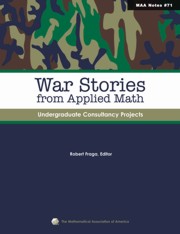Book contents
- Frontmatter
- Contents
- Introduction
- An Industrial Mathematics Program
- Source of Problems: Industrial Contacts
- Panel Discussion Following “Industrial Contacts”
- Course Integration
- The Consortium for Mathematics and Its Applications (COMAP)
- Program Management
- Project Deliverables I
- Project Deliverables II
- Using Projects from Industry to Teach Mathematics and Statistics to Liberal Arts Majors
- Mathematical Modeling in ICIC Projects
- Appendix: A Sample HMC Report
Introduction
- Frontmatter
- Contents
- Introduction
- An Industrial Mathematics Program
- Source of Problems: Industrial Contacts
- Panel Discussion Following “Industrial Contacts”
- Course Integration
- The Consortium for Mathematics and Its Applications (COMAP)
- Program Management
- Project Deliverables I
- Project Deliverables II
- Using Projects from Industry to Teach Mathematics and Statistics to Liberal Arts Majors
- Mathematical Modeling in ICIC Projects
- Appendix: A Sample HMC Report
Summary
What good is mathematics? What is supply-your-favorite-topic-commonly-taught-in-any-math-course used for?
Have you ever had undergraduate students ask either of these questions? If not, you are in a very small minority of college math teachers, probably a set of measure zero. If you have had either of these questions asked, how do you answer? The first question is such a blockbuster that it invites a sweeping reply although one that could be given incrementally: Bar codes to bridges. The second question cannot be satisfactorily answered without some feel for the interests of the person asking the question. Suppose it is pre-med students who ask this question. They will be satisfied by an answer that relates to their professional interest. Geometric series, for example, have application in determining the concentration of a certain drug in a patient's blood system after a treatment of periodic injections, to cite an example drawn from an introductory course in calculus. But a business or an economics major will not find this answer particularly satisfying. Such a student will be happier with an example drawn from the accruing value of a bank account into which periodic payments are made.
This collection deals with these questions but from a somewhat different point of view. Problems are identified and, given the nature of those problems, the appropriate mathematics is brought to bear on their solutions. More specifically, the problems are drawn from sources in what is called–perhaps a tad pretentiously–the Real World. This is to say that mathematicians seek out problems from business, industrial, and local government sources and turn their students loose on these problems with varying amounts of assistance provided by faculty.
- Type
- Chapter
- Information
- War Stories from Applied MathUndergraduate Consultancy Projects, pp. 1 - 4Publisher: Mathematical Association of AmericaPrint publication year: 2007



